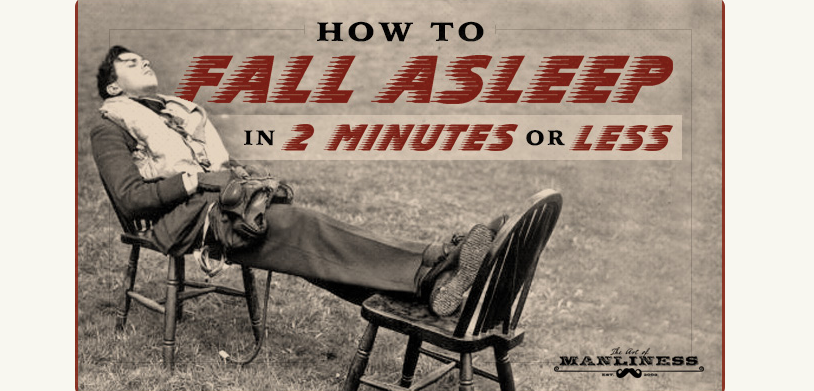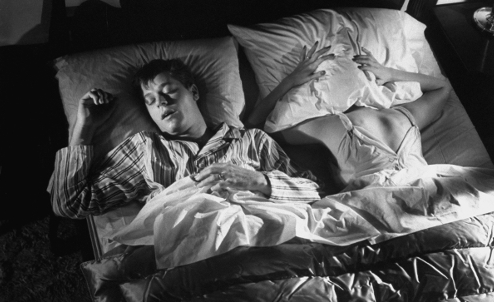
You understand the importance of a good night’s sleep. It increases testosterone, improves memory, and staves off depression. Because you know it’s important, you hit the sack at 10 PM so you can wake up at 6 AM and get the recommended 8 hours of sleep.
You hunker down under the sheets and close your eyes, ready for Mr. Sandman to bring you a dream.
Two hours later you’re still wide awake.
Not being able to fall asleep can be one of the most frustrating experiences in life. Sleep feels sooo freaking good, so being denied it is infuriating.
So what should you do when these desired Zzzz’s allude you?
Below we share some research-backed tips:
1. Don’t immediately go to sleep pills. When you can’t fall asleep, your first inclination may be to take some sort of over-the-counter sleep aid like NyQuil or a sleeping pill. But resist that temptation. Medicinal sleep aids may help you get to sleep a bit faster, but they diminish the quality of your sleep. Not only do they cause you to spend more time in the less restorative stages of your sleep cycle, research suggests that you’ll only get, on average, 11 more minutes of sleep with the pills than you would have without them. 11 extra minutes of crappier sleep, with the likelihood of grogginess in the morning? Usually not worth it.
What’s more, when you resort to sleep aids as your immediate solution, you run the risk of becoming dependent on them to fall asleep. Before you pop a pill or take a shot of NyQuil, try some of the steps below.
2. Darken your room. Is your room completely dark? Any sort of light in your room can disrupt melatonin production in your body, preventing it from naturally falling asleep. Make sure your room is as dark as possible, closing the blinds/shades and covering any light-emitting devices.
3. Turn down the thermostat. Your core body temperature decreases just a tad as you get deeper and deeper into sleep. This may explain why cooler room temps both help you get to sleep faster and contribute to a deeper sleep; you’re just getting that core temp down more quickly. Research has shown that the optimal room temperature for a good night’s rest is a surprisingly chilly 60-67 degrees Fahrenheit, so dial down your thermostat.
4. Try a relaxation exercise. If you can’t fall asleep because you’re feeling stressed, anxious, or are just generally wound up, try out this relaxation exercise used by WWII pilots to fall asleep in just 2 minutes.
5. Get up and go to another room after 30 minutes of lying in bed. If the relaxation exercise doesn’t work, and you’ve been lying in bed wide awake for over 30 minutes, get out of bed and go to another room.
You want to reinforce to your brain that beds are only for sleeping (and sex). If you just lie there doing nothing, your brain will associate your bed with the frustration and anxiety of lying awake doing nothing.
Researchers at Harvard found that individuals who get out of bed and go to another room to do something relaxing when they can’t fall asleep typically end up getting sleepy and have an easier time falling asleep when they return to bed.
What sorts of relaxing activities should you do? Reading fiction is a favorite of mine. Listening to relaxing music can be another. If you’ve got a lot of thoughts in your brain, journal. Try that WWII relaxation exercise while lying on your living room couch.
As soon as you start feeling sleepy, return to your bed.
6. Have a carby snack. Whenever I have a hard time falling asleep, I find a carby snack helps make me drowsy. Research backs up this intuitive strategy. One study points to the insulin production of carb-laden foods as an aid in regulating our circadian rhythm. Another study notes that carby foods can increase the tryptophan in our blood, which induces sleep.
If you’re having a hard time falling asleep, have a banana, a piece of bread, a bowl of cereal, or even just a glass of milk. My favorite “I can’t sleep snack” is a spoonful of peanut butter and a small glass of milk. PB contains a good dose of niacin which helps create calming, sleep-regulating serotonin, and there’s something to that old wives tale about a glass of warm milk before bed too — it contains tryptophan and calcium, which both help regulate the production of sleep-inducing melatonin.
Don’t eat a full meal though (ramping up digestion too much will keep you awake) — no more than 30g of carbs (a piece of whole-grain toast is about 12g, for frame of reference) and go light on the protein; proteins, particularly meats, won’t help you sleep soundly as they’re harder to digest, and may interfere with tryptophan’s effect on your brain (it’s a myth that turkey alone is what makes you sleepy after a Thanksgiving feast).
7. Avoid screens. Blue light is the main culprit in disrupting melatonin at night, and our screens give off a ton of it. If you can’t fall asleep, don’t exacerbate the problem by starting to scroll through your phone. (If you’re reading this in bed, turn off your phone as soon as you’re done!)
8. Take a melatonin supplement. A melatonin supplement can help ease you into sleep. They’re safe and can be bought at most health food stores. You don’t need much for it to have an effect. Go for the smallest dose.
9. Try sleeping somewhere else. I couldn’t find any research to back this up, but when I have a hard time falling asleep, for some reason sleeping in another part of the house does the trick. I think without the associations of being in bed, the brain doesn’t feel the pressure to fall asleep, and that ironically relaxes it enough to do so.
10. If all else fails, take a sleeping aid. If you’ve done all the above and you still can’t fall asleep, go ahead and pop that sleeping pill. Crappy sleep caused by a sleep aid is better than no sleep. Don’t mix it with alcohol.
11. Make the best of the situation. If the sleep aid doesn’t work either (I’ve had that happen to me), you’ll just need to make the best of the situation. Read a book. Do some soul searching and life planning. Write poetry. Journal. Just don’t get anxious about not being able to fall asleep. It will make going to sleep the next night another anxiety-inducing event, which in turn will again prevent you from falling asleep. Soon you’ll be stuck in a cycle of insomnia. Just shrug this sleepless night off; you’ll be a little more tired tomorrow, but will be just fine. Life will go on.
12. Review your sleep hygiene to get a better night’s sleep next time. To prevent another sleepless night in the future, audit your sleep hygiene to ensure you’re not doing anything during the day to sabotage your slumber:
- Do you consume caffeine late in the day? Caffeine’s half-life (how long it lingers in your body) is 3-5 hours, meaning that that cup of joe or energy shot you drank at 5 PM could still be having a stimulating effect on you at 10 PM.
- Do you view screens right before bed? Make sure you’re avoiding screens an hour before you hit the sack. If you do use screens, make sure there’s some sort of blue light filter on them.
- Do you exercise each day? Sleep is the body’s way of restoring itself after each day’s effort; if you don’t make any kind of effort, sleep becomes less vital and more elusive. The greatest sleep aid is physical exercise (fresh air helps too!).
- Do you go to bed and wake up at the same time every day? A set routine habituates the body’s sleep/wake cycle.
If you experience several sleepless nights, go talk to your doctor about possibly getting a sleep study done.
Be sure to listen to our podcast on how to get a better night’s sleep:







